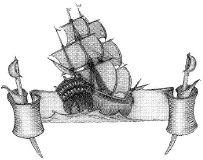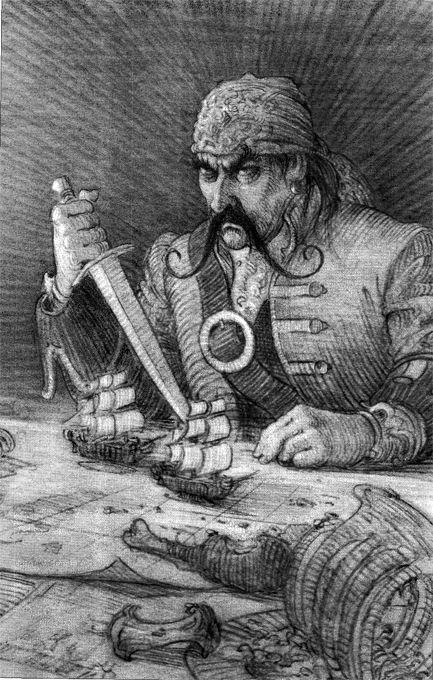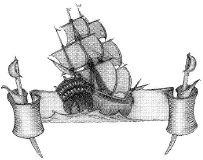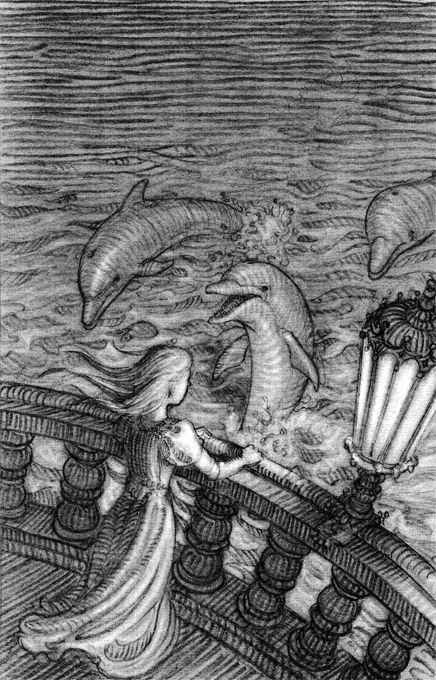Peter and the Starcatchers (9 page)
Read Peter and the Starcatchers Online
Authors: Dave Barry,Ridley Pearson
Tags: #Juvenile Fiction, #Fiction, #General, #Family, #Social Science, #Fantasy, #Action & Adventure, #Magic, #Friendship, #Pirates, #Juvenile Nonfiction, #Orphans, #Nature & the Natural World, #Humorous Stories, #Orphans & Foster Homes, #Adventure and Adventurers, #Islands, #Folklore & Mythology, #Characters in Literature

“Peter,” she said, “listen to me. This is very important. You mustn’t…”
“MOLLY!” The two youngsters were suddenly separated by the massive form of Mrs. Bumbrake, her front side toward Mol y, leaving Peter face-to-face with her formidable backside. “I’ve told you a thousand times, you are
not
to be on this deck without me, and you are to stay away from the riffraff.”
“But…”
“No back talk, young lady! You come with me!” With Mol y in tow, Mrs. Bumbrake barged away, leaving behind a cloud of lavender.
Peter watched them go.
I mustn’t what?
He drifted forward, toward a knot of sailors who were pretending to work while they gossiped. There was much to gossip about. There were the two rescued pirates, of course, but also something else, something that had happened last night, news of which was circulating around the ship.
“… guarding the door,” one of the sailors was saying. “He says one minute he was wide awake, next minute he wakes up on the floor. Like there was a spel cast on him, he says.”
Peter moved closer.
“Magic spel ?” scoffed another sailor. “Not hardly. Too much rum, that’s your magic spel .”
“No,” said the storytel er. “Not John. He don’t drink, not a drop. That’s why Slank give him the guard duty. No, he says something put him out, and when he woke up, there was people in the room, voices. So John goes running in there, and somebody runs right into him!”
“Who?”
“He didn’t see. It happened sudden, he says. But whoever it was, he trips John, and down John goes, headfirst into that trunk.”
“What’s in that trunk, anyway?”
“Dunno,” said the storytel er, “but whatever it is, Slank guards it like gold. So anyway, John’s trying to get up, and his head feels bust open, and he looks up, and then he sees it.” The storytel er paused dramatical y.
“What?” asked one of the listeners. “He sees what?”
“A rat,” said the storytel er. “A
flying
rat.”
“You mean it was jumping? ’Cause I’ve seen ’em jump as far as …”
“No,” said the storytel er. “John says it was flying.”
“That’s the bump on his head talking,” said one.
“I dunno. It ain’t like John to imagine things.”
“Wel I don’t believe it. I’ve sailed with rats for thirty years, and they don’t fly.”
“I think it’s true,” said a new voice, from a big man with a big wart on his nose—the sailor Peter had seen acting strange around the mysterious cargo on the first day. He looked around at the group. “I believe John,” he said.
“Why’s that, Alf?”
“Because the rat was in the room with that trunk. I touched that trunk, the day we set sail. There’s something strange about it.”
“Strange is one thing, Alf. Flying rats is another.”
“But I’m tel ing you, I
felt
it,” said Alf. “I felt something, I dunno,
magic.
I felt like …” Alf looked around, hesitant.
“Like what, Alf?”
“Like … like I could fly,” said Alf.
There was a pause, and then the crowd erupted in laughter.
“Sure, Alf, you could fly!”
“You’re a regular bluebird, Alf!”
“Look out,” said somebody. “Slank’s coming.”
The sailors, stil chuckling, quickly dispersed, leaving Alf, red-faced, staring at his feet. Peter hesitated, then approached the big man and tugged at his sleeve. Alf looked down at him.
“What is it, boy?” he said.
“I believe it, too,” said Peter. “About the rat.”
Alf frowned. “Why?” he said.
Peter hesitated, then said, “Because I saw it.”
Alf bent over, his face now close to Peter’s.
“You saw it, boy? You was down there?”
Peter nodded.
“Did you see anything else?” said Alf. “Did you happen to see what’s in the trunk?”
“No, sir,” said Peter.
Alf studied him, then spoke softly. “But you want to,” he said. “You want to know what’s in there.” Peter nodded again.
“Me too, boy,” said Alf. “Me too.”


BLACK STACHE CLOSES IN
B
LACK STACHE HEARD THE SHARP WHISTLE pierce the night air—sounding like a gul’s hungry cry—and lifted his head to see his lookout wave from the crow’s nest.
We’re in range.
Stache banged the butt end of his sword on deck twice—
thump, thump.
Instantly, the eight long oars sticking out from the cannon bays lifted from the sea in unison, dripping water, and withdrew into the ship’s hul . The crew, desperate now for water as wel as treasure, had been hard at it ’round the clock for almost two days straight, working both the sails and oars, reading the winds perfectly, closing the gap on the
Wasp.
Now they were ready for the final run.
She’s
mine.
Black Stache thumped his sword three more times to summon his officers, then retreated below to his cabin, taking a seat at a table covered with navigational charts. Also on the table were two smal , delicate models of sailing ships, one painted a shiny black like the
Wasp,
the other a replica of the
Sea Devil.
There was a tentative tap at the door.
“Come in,” growled Black Stache. Smee entered and gagged; the cabin smel ed like a dead cow. This was because there were, in fact, several pieces of dead cow on Black Stache’s bunk, as wel as the half-eaten carcass of a turkey. Gnawed remnants of other meals littered the floor. Flies buzzed everywhere. Smee held his hand over his nose, trying to be discreet about it.
“You cal ed, Cap’n?” he said, his voice muffled.
“It’s time,” said Stache, staring at the model ships. “The moment is at hand.”
“Yes, sir,” said Smee, turning, desperate to escape the eye-watering stench. “I’l just go up and tel the—”
“Wait,
” said Black Stache. “I want to go over the final plan with you and Storey.”
As Smee reluctantly turned back, there was a second knock, and Storey, the
Sea Devil’
s crew chief, entered. He fel back, momentarily staggered by the odor, then scrunched up his face and forced himself forward into the cabin, like a man walking against a gale.
“Aye, Cap’n?” he said, through gritted teeth.
“Sit down, men,” said Stache.
Smee and Storey looked around. There was nowhere to sit except the bunk, which was covered with rotting food, and a wooden stool, upon which sat a large fur-covered lump
—an old cheese, perhaps, or a dead cat.
“If it’s al the same, Cap’n,” said Storey, “I’l stand.”
“Me, too, Cap’n,” said Smee.
Black Stache looked around his cabin, apparently noticing its condition for the first time.
“Smee,” he said, “where the devil is my cabin boy? This place is a mess.”
“You had him walk the plank, Cap’n,” said Smee.
“I did?”
“You did, Cap’n,” said Smee. “For touching your model ships.” Smee chose not to add that the cabin boy had walked off the ship almost cheerful y, knowing he would no longer have to try to clean Black Stache’s cabin.
“Ah, so I did,” said Stache. “I’l want you to get me a new cabin boy when we take the
Wasp.
”
“Aye, Cap’n,” said Smee. This would be the sixth cabin boy in less than a year.
“Now, about the
Wasp,
” said Black Stache, looking at Storey. “Are we ready?”
“We are, Cap’n,” said Storey. He pointed toward the ship models, careful not to touch them. “We’ve been gaining steady, with the rowing. Now we’re sitting just right for a downwind run. Your plan was right on the money, Cap’n. I don’t care how fast the
Wasp
is; with this wind, and this heading, when we raise the Ladies, we’l close on her in no time.”
“And the Ladies are ready?” said Black Stache.
“Aye, Cap’n.”
“Al right, then,” said Black Stache, pausing dramatical y, savoring the moment. “Raise the Ladies.”
“Aye, aye, sir!” shouted Storey and Smee, lunging for the doorway, and fresh air.
After they left, Black Stache turned his eyes to his model ships. He put his hand gently, almost lovingly, on the model of the
Sea Devil.
Slowly, he moved it forward until it touched the
Wasp.
He kept pushing until the
Wasp
reached the edge of the table. Then, smiling, he gave it a vicious shove; the
Wasp
model fel , its delicate hul smashing into pieces on the floor. Black Stache laughed, his breath further befouling the rancid cabin air. Then he stood and, stepping on the remains of the
Wasp,
stalked out of the cabin.
Time for the kill.


THE MESSENGERS
I
T WAS JUST BEFORE MIDNIGHT, an overcast night, no moonlight or starlight reaching the dark deck of the
Never Land.
The wind was steady at about five knots; the fat ship plowed forward on a fol owing sea.
Mol y, wearing a blanket like a cloak over her nightgown, emerged from the ladderway and looked quickly around. Seeing no one, she walked swiftly to the stern rail, her feet bare on the scarred wood of the deck. She’d not dared to put on shoes when she’d left the cabin, for fear she’d wake the snoring Mrs. Bumbrake.
After glancing quickly around again, she leaned over the stern rail and peered out at the dark water. She saw only the ship’s churning wake, ghostly pale by the light of the ship’s lone stern lantern. Her eyes strained to see more.
Where were they?
She wondered if she was too early. Or, worse, too late.
Tel ing time on the ship was a problem, especial y when overcast skies kept Mol y from seeing the stars.
Five minutes went by. To Mol y, it felt like an hour.
Where were they?
Mol y heard a man’s voice, and she tensed, ready to race back to the ladderway. But then she heard another voice, and realized it was two sailors, wel forward, passing another long night watch with the endless gossip of a ship at sea.
Mol y relaxed and turned her gaze back toward the …
What was that?
She squinted at the patch of dark water where she thought she’d seen something, at the rightmost edge of the roiling wake.
There!
Mol y’s heart leaped as a gray shape flowed from the water, forming a graceful arc before disappearing again beneath the surface. The shape was fol owed by another, then another.
